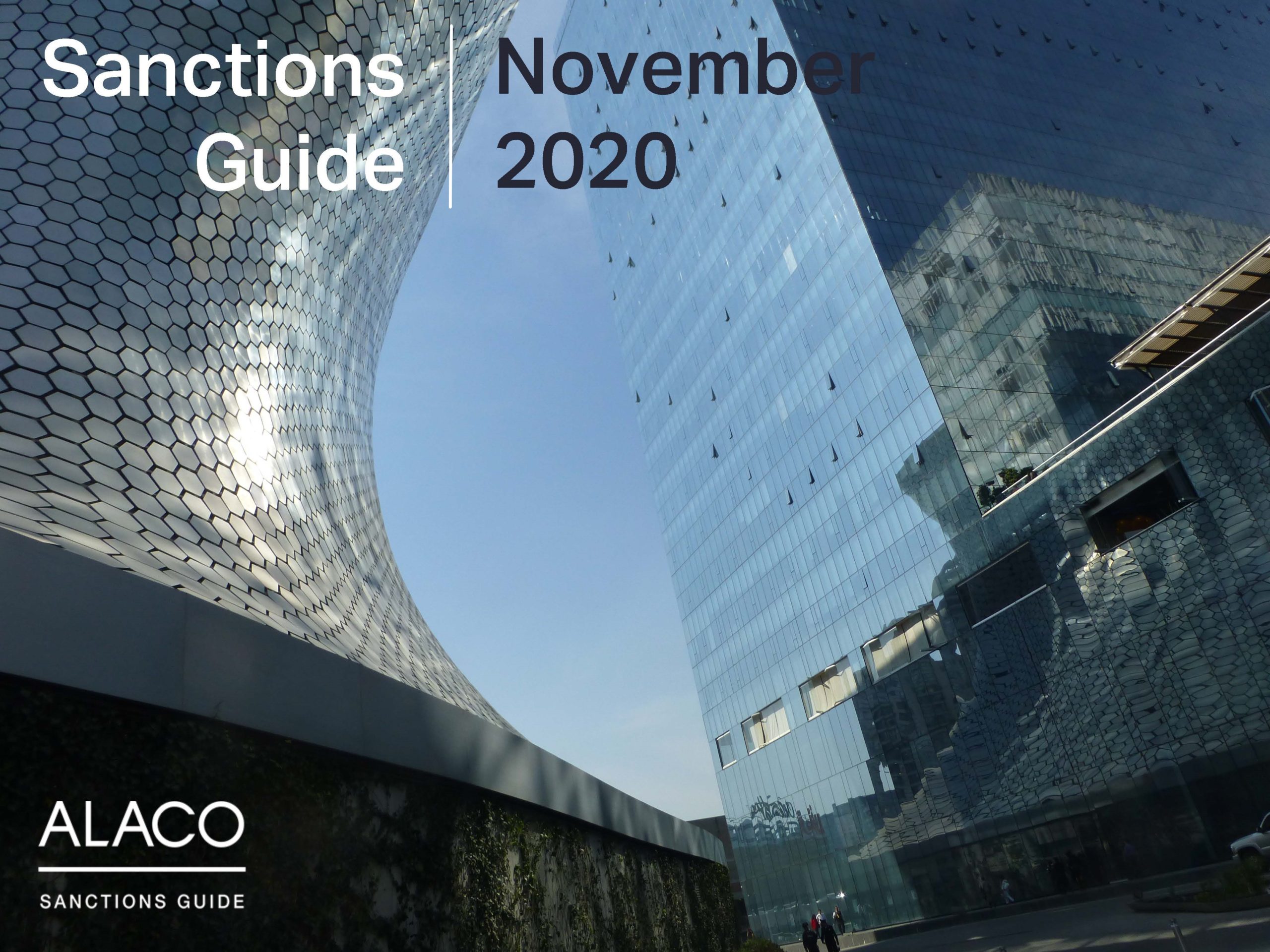Key sanctions developments in October include EU moves against Russian officials implicated in the alleged poisoning of Alexei Navalny and a cyberattack on the German parliament; the tightening of US restrictions on the Iranian oil industry; and the UK, EU and US considering new measures against Turkey.
- Turkey is facing the prospect of being sanctioned by the US and the EU. Senior State Department official Clarke Cooper has publicly stated that Ankara risks being targeted for testing Russia’s S-400 air defence system, which it bought in 2017. Washington has warned that use of the system is incompatible with Turkey’s membership of NATO. Legislation passed by Congress in 2017 sets out sanctions for countries that buy significant quantities of arms from US adversaries, including Russia. EU leaders have, meanwhile, indicated that they are prepared to use sanctions against Turkey if it continues what they see as illegal energy exploration activities in waters claimed by Cyprus and Greece.
- Turkey is also a potential subject of sanctions measures in the UK. British barristers, acting for the NGO the Arrested Lawyers Initiative (ALI), are preparing a submission to the UK’s foreign office in an effort to trigger Magnitsky-style sanctions against Turkish prosecutors and officials implicated in the imprisonment of hundreds of lawyers since the failed coup in 2016. The ALI claims that many leaders of Turkey’s local bar associations and judges who have refused to act at the government’s direction have been detained and arrested on trump-up charges. The measures would be taken under the UK’s new global human rights sanctions legislation, modelled on the US Global Magnitsky Act.
- The EU is itself moving closer to adopting a global human rights sanctions regime, which will give it greater flexibility to target those deemed to be responsible for serious violations worldwide. It has publicly stated that the new regime, also similar to the Global Magnitsky Act, will not replace existing geographical sanctions regimes, some of which already address rights abuses.
- Elsewhere, the EU has taken a firm stand over the alleged poisoning of Russian opposition leader Alexei Navalny, imposing travel bans and asset freezes against six top Moscow officials, including FSB chief Alexander Bortnikov and two deputy defence ministers. The chemical research facility believed to have been the source of the nerve agent has also been sanctioned. Navalny fell ill on a Russian internal flight shortly before city council elections in Russia. He was later airlifted to a Berlin hospital. The Organisation for the Prohibition of Chemical Weapons has confirmed that Novichok was used against Navalny. The Kremlin has denied any role in the alleged poisoning.
- The EU has also warned Russia that it will no longer tolerate its cyber-sabotage activities, sanctioning the head of Russian military intelligence (GRU), Igor Kostyukov, over an attack on the Bundestag’s information system in 2015. Kostyukov has already been blacklisted by the EU for his role in the Skripal poisoning. The GRU’s Special Services division was sanctioned for being the source of the cyberattack on the German parliament and a second military intelligence official, Dmitry Badin, for being part of the hacking team. Badin is also suspected by the US of trying to influence the 2016 presidential election. The UK has announced that it will also apply the EU sanctions.
- Separately, after a long delay, the EU has sanctioned 40 Belarusian officials implicated in the alleged rigging of Belarus’ presidential elections and subsequent repression. The Union is also preparing to sanction President Alexander Lukashenko himself in a further sanctions package.
- The EU has removed two prominent Libyan politicians from its list of individuals and entities sanctioned in connection with the Libyan conflict. The two, Agila Saleh, speaker of the Tobruk-based House of Representatives, and Nuri Abu Sahmain, the ex-president of the unrecognised General National Congress of Libya, had been subject to the bloc’s restrictive measures since 2016. The EU said the delisting of Saleh was agreed in light of his recent backing for a negotiated political solution to the country’s security and political crisis, while that of Sahmain stemmed from him not having any recent role in the political process. The EU is believed to view Saleh as key to efforts at a rapprochement between the two sides in the Libyan conflict.
- In the US, just days before the presidential election, the Trump administration has imposed new sanctions against Iran, tightening already tough restrictions on the country’s petroleum industry. Some believe that the latest measures will make it harder for a possible Biden presidency to reverse US sanctions in negotiations with Tehran on reviving the international agreement on Iran’s nuclear programme. Washington withdrew from the deal in 2018. The new round of measures target Iran’s Ministry of Petroleum, the National Iranian Oil Company and its oil-tanker subsidiary, together with other entities and individuals. The organisations are suspected of supporting the Quds Force of the Islamic Revolutionary Guards Corps, regarded by Washington as a terrorist organisation.
- Washington has warned businesses that they may be in breach of US sanctions by making ransomware payments to cybercriminals. In an advisory, the US Treasury says that demand for such payments has increased during the pandemic. It adds that companies that facilitate payment on behalf of victims not only encourage future demands but also may risk violating OFAC regulations. Numerous cyber actors are designated under OFAC cyber-related measures and other sanctions programmes.
- President Trump’s sanctioning of officials at the International Criminal Court, imposed in June, in response to the ICC’s investigation into whether American troops committed war crimes in Afghanistan, is subject to a legal challenge from NGO the Open Society Justice Initiative. In filings at a New York district court, the Initiative argues that Trump’s executive order violates constitutional rights and prevents the plaintiffs from working to support international justice.


